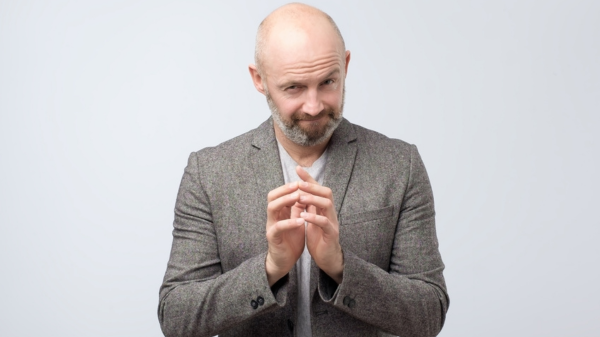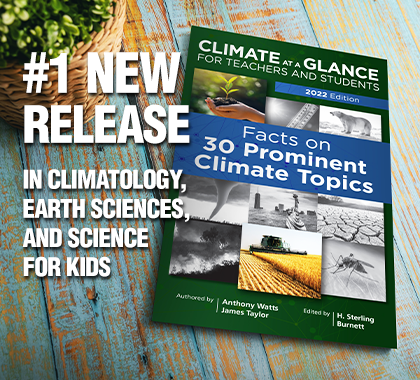YOU SHOULD SUBSCRIBE TO CLIMATE CHANGE WEEKLY.
IN THIS ISSUE:
- Science Teachers Are Subverting an Accurate Understanding of Climate
- Podcast of the Week: Challenging the Net-Zero Narrative: Steve Goreham on the Perils of Green Energy
- Causes of Warming Debatable, but Urban Heat Islands Is Certainly One
- Corals Adapting to Warming, Increasingly Resistant to Bleaching
- Video of the Week: The Harms of Biofuels and Why Climate Change Alarmism Is Losing
- Climate Comedy
- Recommended Sites
Miss Anything at Heartland’s Climate Conference? No Problem.
Science Teachers Are Subverting an Accurate Understanding of Climate

Editor’s Introduction: I had originally planned to write an extended critique of claims made in a recent interview by Jonathan Osborne, a professor of education at Stanford University, whom the piece refers to as “an expert in science education.” If his own words prove anything, it is that Osborne has no business teaching science or science educators. An old Pogo cartoon once opined, “We have met the enemy and he is us.” The same could be said of science educators and advancement in science if what they are teaching and being taught by the likes of Osborne is any indication.
First, Osborne thinks it is dangerous for average people to approach science; they need to have it filtered by “experts.” Per Osborne, the hoi polloi aren’t capable of understanding science. Since that’s the case, it is perhaps not entirely surprising that Osborne doesn’t advocate teaching actual science, but rather political science, the art of compromise and comity.
Science is an activity and a discipline in the pursuit of knowledge. Osborne egregiously states and evidently teaches “the goal of science is the achievement of consensus.” No mention of the scientific method or critical thinking or challenging ideas but rather the pursuit of consensus, which is a political term and sometimes a goal, but not a scientific term. By contrast, as Wikipedia puts it, “[s]cience is a rigorous, systematic endeavor that builds and organizes knowledge in the form of testable explanations and predictions about everything,” or as the Oxford English Dictionary states, science is “the systematic study of the structure and behavior of the physical and natural world through observation, experimentation, and the testing of theories against the evidence obtained.” Did you notice what wasn’t mentioned at all in either traditional definition of science and its goals? CONSENSUS.
If consensus was the goal of science, Galileo would have been wrong to challenge the idea that the Earth was flat, and Copernicus that the Earth was the center of the universe. Those positions were the consensus, but they were wrong, and only because Galileo and Copernicus bucked the consensus did we come to the truth. In his book, The Structure of Scientific Revolutions, Thomas Kuhn compellingly argued that the advancement of knowledge was driven by revolutionary ideas and theories which, when tested through experimentation, overthrew previous ideas of “settled science,” or consensus thinking. Consensus in science only forms, if it forms at all, after an idea or theory about an area of knowledge has proven more compelling than other possible explanations. And, even the best theories can be overturned with a single disconfirming piece of evidence.
Osborne’s view of the goal of science being consensus would leave us in the dark ages or earlier. Aside from that, Osborne thinks that it is not arguments and proofs that are important in advancing knowledge, but who is making those arguments and who may or may not be supporting or funding them. Clearly Osborne failed elementary logic, since his idea of what science consists of and how it advances is composed of a number of well-known logical fallacies that first-year philosophy students have drummed into their heads—fallacy of appeal to authority; fallacy of ad hominem; fallacy of appeal to numbers, to name but a few of his most egregious lapses in logic. Truth is not dependent upon the personality or position of the person or groups making an argument, nor is it based on how many people believe it; rather, it is based on whether it corresponds to physical reality—which, contrary to the beliefs of modern deconstructionist thinkers and critical theory proponents, is not socially constructed.
Things exist and are what they are, regardless of one person’s or groups of people’s beliefs about them. One can call a bear a kite, but that won’t make it take wing in an updraft.
For Osborne, science is a process of social construction of reality—and knowledge is created by a show of hands and collegial agreement—rather than a method through which the nature of things are discovered through experimentation, testing, and the exchange and competition of ideas. Osborne’s view of science is a schoolyard popularity contest among elite specialists. By contrast, real science is the laboratory and the field, where objective measurements are made. Proof—not belief, data or votes, is the hallmark of science. But you wouldn’t know that from reading the interview conducted with Osborne. Shockingly, but perhaps not surprisingly with the state of journalism being what it is these days, nowhere in the interview does the interviewer challenge any of Osborne’s assertions.
Having said all this, a long-time friend of mine, independent physicist John Droz, conducted an extensive analysis of Osborne’s claims about “how to beat bad science,” which he kindly let me reproduce below.
The Greatest Threat to Science Is from Within
A Progressive tips his hand about how they are trying to undermine Science
One of Lincoln’s most powerful speeches is the Lyceum Address. The key message is that we should not be so worried about overseas enemies, as corruption from within is our most serious threat…
At what point shall we expect the approach of danger? By what means shall we fortify against it?– Shall we expect some transatlantic military giant, to step the Ocean, and crush us at a blow? Never!--All the armies of Europe, Asia, and Africa combined, with all the treasure of the earth (our own excepted) in their military chest; with a Buonaparte for a commander, could not by force, take a drink from the Ohio, or make a track on the Blue Ridge, in a trial of a thousand years.
At what point then is the approach of danger to be expected? I answer, if it ever reach us, it must spring up amongst us. It cannot come from abroad. If destruction be our lot, we must ourselves be its author and finisher. As a nation of freemen, we must live through all time, or die by suicide.
I thought of this as I read the interview of one Stanford professor of another. The title is “How To Beat Bad Science.” If that wasn’t enticing enough for me, the person being interviewed (Dr. Jonathan Osborne) was identified as a “science education expert.”
I thought wow! Since I’m a K-12 science education expert, this should be right up my alley, in my lane, fit me like a glove, etc. However, it was a major disappointment.
Interesting note: At no time in the interview does Jonathan define “Bad Science!” Reading between the lines here, the implied definition is when scientists advocate anything that goes against government technical policies (like the net negative consequences for school children to wear masks for COVID-19 — e.g., here).
Ignoring the significant deficiency of the missing key definition, Jonathan says that for students to beat “bad science” they need to learn three skills: 1) be aware of conflicts of interest, 2) evaluate the source’s qualifications, and 3) more rigorously question those who go against consensus!
Point one would evidently be to look for one of the thousands of scientists who are funded by the fossil fuel industry—even though in 40+ years I have yet to find any.
Point two might be to ignore any evidence presented by a scientist, not a specialist—e.g., “only climatologists are qualified to evaluate the claims in climate science.” (This is to deceive the public, as real Scientists know that any Scientist can legitimately comment on the adherence to scientific principles by those in any field of Science.)
To reinforce the surprising third point he goes on to say that: The whole goal of science is consensus! OMG. Here I’ve been laboring for over four decades under the assumption that the goal of Science was: to give us a better understanding of our material existence. Now I find out that the whole goal of science is consensus!
I thought that politics was the field that focused on consensus, not Science. Maybe Jonathan wants us to equate real Science with political science. I’ve written about that problematic deception before (e.g., here), as it is a plague of our times.
It also occurs to me that if the objective of scientists is to agree with other scientists, how can we possibly make any societal progress? If scientists live and work in an echo chamber, nothing substantial will ever change. What sense does that make?
Further, I was always under the impression that the great scientists in history were outstanding because they looked at things differently—which almost always was against the current consensus. Apparently, Jonathan does not understand that. …
As misguided as the above are due to what is said in that interview, arguably the worst parts are about what is not said. For example, there is not a word of advice for students to learn and apply the Scientific Method. It has been around in some form or other for some 4,000 years—and used by people like Newton, Curie, Einstein, etc. Seems that if it was helpful for those giants of Science, it might be useful to K-12 students. But not a word in this interview is advocating the Scientific Method!
Why would Progressives hate the Scientific Method? Because almost every Progressive technical policy (e.g., industrial wind energy) that is subjected to the Scientific Method, fails. That left them two choices: a) advocate technical policies that are actually science-based, or b) get rid of the Scientific Method. They chose b.
Worse is the glaring omission of Critical Thinking. Why wouldn’t the top advice of an “expert science educator” start out with the importance of Critical Thinking? In fact, it could be argued that his first two points would be assumed subsets of a genuine Critical Thinker’s methodology.
But his third point is where the S hits the fan. Having a default position supporting consensus (i.e., conformity) is the exact opposite of Critical Thinking! In the subject area of Science, K-12 students are supposed to be taught to question everything—especially consensus!
Why are Progressives opposed to Critical Thinking? Because their worst fear is to have a citizenry of Critical Thinkers! They want compliant citizens who don’t ask questions, and who go along with whatever policies are proposed, regardless of their scientific sensibility. Think COVID-19 policies.
The more I thought about these two glaring omissions (the Scientific Method and Critical Thinking) the more it struck me that these exactly reflect the anti-Science mentality conveyed in the [Next Generation Science Standards] NGSS and its basis, the Framework— now used by some 45 states in their K-12 education. (See my Education Report for more details.)
On a whim, I decided to check out a hunch I had, so I just looked up who were the Progressive authors of the Framework (which became the NGSS). Here they are.
Scroll down and—mirabile dictu—there is Jonathan Osborne! Who woulda thunk?
This should convey a VERY clear idea of the mentality of the select Progressive clique that wrote the K-12 Science Standards—again, now used in some 45 states!
Please read about my success in reversing some of that in North Carolina, plus a subsequent post about how committed citizens can do the same in their state…
P.S. I emailed both of these co-conspirators and stated my primary objection. If I get anything of value back, I’ll post it here. So far zip, so don’t hold your breath!
- John Droz
Sources: Cyprus CEO; Critically Thinking
Get your Copy at Amazon TODAY!

Podcast of the Week
Steve Goreham, author of “Green Breakdown,” joins the show. Steve discusses how efforts to fight climate change by going to net-zero carbon dioxide emissions are unnecessary and doomed to fail. The process of transitioning to an energy grid from intermittent renewables will cause further breakdowns of our energy system. Mandates on cars have safety concerns, but more, rob us of our rights. And the energy mandates will leave our homes dark.
Subscribe to the Environment & Climate News podcast on Apple Podcasts, iHeart, Spotify or wherever you get your podcasts. And be sure to leave a positive review!
Causes of Warming Debatable, but Urban Heat Islands Is Certainly One

New research published in the journal Climate confirms what earlier research has shown: much of the warming measured since 1850 has little if anything to do with rising greenhouse gas concentrations, but a lot to do with artificial upward biases introduced to the temperature record from urbanization, or the urban heat island effect.
A team of 38 scientists and investigators from universities and research institutes in 18 countries representing four of the seven continents undertook a statistical analysis of changes in the land surface temperatures in the Northern hemisphere from 1850 to 2018, in an attempt to determine the main factors driving warming during that period.
They compared two sets of records: temperatures from rural stations only and temperatures from a blend of rural and urban stations. The rural-urban blend measured “a long-term warming of 0.89°C per century since 1850. By contrast the rural only stations measured a significantly lower temperature rise of approximately 0.55°C, per century.
“This contradicts a common assumption that current thermometer-based global temperature indices are relatively unaffected by urban warming biases,” notes the study.
After examining three different suggested systems and time-series analyses to account for various forcing mechanisms, the team of researchers “found that altering the temperature estimate and/or the choice of solar forcing [i.e., Total Solar Irradiance (TSI)] dataset resulted in very different conclusions as to the primary drivers of the observed warming.”
After undertaking both set of analyses, they concluded:
important challenges remain for the broader detection and attribution problem of global warming: (1) urbanization bias remains a substantial problem for the global land temperature data; (2) it is still unclear which (if any) of the many TSI time series in the literature are accurate estimates of past TSI; (3) the scientific community is not yet in a position to confidently establish whether the warming since 1850 is mostly human-caused, mostly natural, or some combination.
This research, if correct, indicates that the causes and consequences of global warming are still very much open to debate and certainly not settled science.
Source: Climate
Heartland’s Must-read Climate Sites
Corals Adapting to Warming, Increasingly Resistant to Bleaching

Research and surveys covering different types and populations of coral from various regions around the global show, in general, corals are doing well, and are generally recovering from bleaching when it has occurred. This fact suggests that corals are either adapting in response to environmental stressors, or they are more resistant to conditions which contribute to bleaching than previously understood, or both.
For example, the most recent survey of the Great Barrier Reef’s (GBR) hard coral shows that although the recovery from multiple bleaching events slowed in 2022/2023, coral still remains at historically high levels.
A study in the journal Ecosphere provides a hint concerning why coral in the part of the GBR they examined are doing will despite bleaching: high resilience. In other words, the coral colonies studied were resistant to or have adapted over time to warmer waters.
According to the Ecosphere paper, severe coral bleaching affected 75 to 98 percent of coral cover throughout the Keppel Islands at the south end of the GBR. The researchers found some species of coral were more affected than others, but site-specific heat-exposure was not correlated with bleaching. They wrote:
Despite severe bleaching and exposure to accumulated heat that often results in coral mortality (degree heating weeks ~4–8), cover remained stable. Approximately 94% of fate-tracked Acropora millepora colonies survived, …. Severe bleaching followed by rapid recovery and the continuing dominance of Acropora populations in the Keppel Islands is indicative of high resilience. These coral communities have survived a 0.8℃ increase in average temperatures over the last 150 years.
Of course, the GBR is just one—the largest but still just a single—coral reef system. Fortunately, research recently published in Nature suggests that what holds for coral there also seems to hold for other coral reefs and colonies.
The Nature paper found that despite increases in ocean temperatures of 0.1℃ per decade, the remote Pacific coral reef systems studied displayed “an emergent increase in the thermal tolerance of coral assemblages [which] … led to less severe bleaching impacts than would have been predicted otherwise, indicating adaptation, acclimatisation or shifts in community structure.”
Honestly, these results should not surprise anyone. As explained in Climate at a Glance: Coral Reefs, coral developed more than 40 million years ago and have existed continuously since then, having evolved during and survived multiple periods when temperatures and carbon dioxide levels were significantly higher than what are occurring today. Indeed, coral thrive in warm water, not cold water, and recent warming has allowed coral to expand their range poleward, while still thriving near the equator.
Sources: The Australian (behind paywall); Ecosphere; Nature Communications; Phys.org
Video of the Week
This episode of Change Roundtable features previous talks by panelist Linnea Lueken and former host, current producer Andy Singer. Linnea discusses the harms of biofuels, something oft not mentioned in the corporate media. Andy discusses the way climate change is taught in schools, then analyzes the effects the rise of alternative media sources have had on the corporate media’s climate change narrative.
Watch every episode of The Heartland Institute’s Climate Change Roundtable show LIVE every Friday at 1 p.m. ET.































